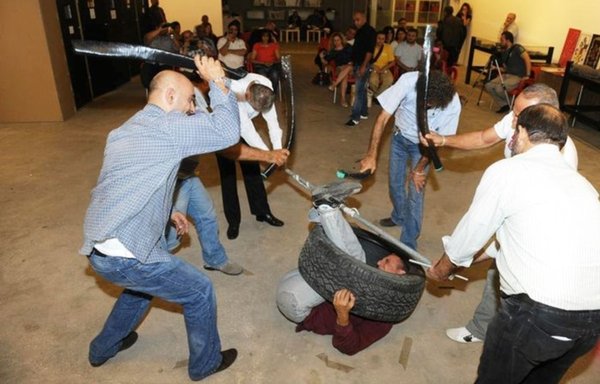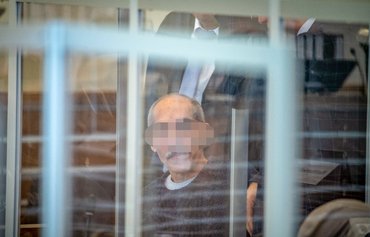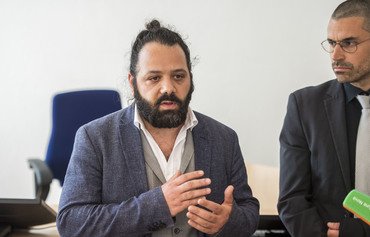A German court on Wednesday (February 24) convicted a former Syrian intelligence service agent for complicity in crimes against humanity, in the first court case worldwide over state-sponsored torture by the Syrian regime.
Eyad al-Gharib, 44, was found guilty over his role in helping to arrest protesters and deliver them to a detention centre in Damascus in 2011 and sentenced to four years and six months for "aiding and abetting a crime against humanity".
The judgement is the first in the world related to the brutal repression of protesters by the regime in Damascus.
Al-Gharib, a former low-ranking member of the intelligence service, is accused of helping to arrest at least 30 protesters and deliver them to Al-Khatib detention centre in Damascus after a rally in Duma.

A still from the film Tadmor shows Syrian prison guards torturing an inmate by strapping him to a car tire in a method known as "the wheel".
He is the first of two defendants on trial since April 23 to be sentenced by the court in Koblenz, after judges decided to split the proceedings in two.
The second defendant, Anwar Raslan, 58, is accused directly of crimes against humanity, including overseeing the murder of 58 people and the torture of 4,000 others. Raslan's trial is expected to last until at least the end of October.
The two men are being tried on the principle of universal jurisdiction, which allows a foreign country to prosecute crimes against humanity, including war crimes and genocide, regardless of where they were committed.
'Cog in the machine'
Other such cases have also sprung up in Germany, France and Sweden, as Syrians who have sought refuge in Europe turn to the only legal means currently available to them.
Prosecutors in Koblenz had been seeking five and a half years for al-Gharib, who defected in 2012 before finally fleeing Syria in February 2013. After spending time in Turkey and Greece, he arrived in Germany on April 25, 2018.
Prosecutors accused him of being a cog in the machine of a system where torture was practiced on an "almost industrial scale".
During the trial, al-Gharib wrote a letter read out by his lawyers in which he expressed his sorrow for the victims.
And it was with tears streaming down his face that he listened to his lawyers call for his acquittal, arguing that he and his family could have been killed if he had not carried out the orders of the regime.
But Patrick Kroker, a lawyer representing the joint plaintiffs, argued that al-Gharib could have been more forthcoming during the trial, rather than keeping silent throughout the hearings.
People like him "can be very important in informing us about the (Syrian officials) we are really targeting, but it is something he chose not to do", said Kroker.
Appalling abuses
During the trial, more than a dozen Syrian men and women took the stand to testify about the appalling abuses they endured in Al-Khatib detention centre, also named "Branch 251".
Some witnesses were heard anonymously, with their faces concealed or wearing wigs for fear of reprisals against their relatives still in Syria.
The trial also marked the first time that photos from the so-called Caesar files were presented in a court of law.
The 50,000 images taken by Syrian military police defector "Caesar" show the corpses of 6,786 Syrians who had been starved or tortured to death inside the Syrian regime's detention centres.
These included photographs that show the mutilated bodies of prisoners with numbers marked on their foreheads.
They were scrutinised during the trial by forensic scientist Markus Rothschild, whose analysis constituted overwhelming material evidence.
The Syrian Observatory for Human Rights estimates that at least 100,000 people have died from torture or as a result of horrific conditions in regime prisons, with half a million people passing through Syrian jails since 2011.
Fresh evidence of the Syrian regime's crimes continues to emerge.
To hold the government of Syrian president Bashar al-Assad accountable for its crimes, the US government passed the Caesar Syrian Civilian Protection Act of 2019, which came into effect in June.
Since then, it has issued a raft of sanctions against figures close to the regime, including al-Assad's wife and teenage son.

![In this file photo taken last April 23, Syrian defendant Eyad al-Gharib hides his face as he arrives for an unprecedented trial on state-sponsored torture in Syria, at court in Koblenz, western Germany. [Thomas Lohnes/AFP/POOL]](/cnmi_di/images/2021/02/24/28602-Syria-torture-trial-600_384.jpg)






